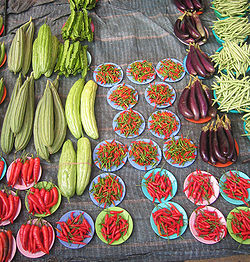Course:ECON371/UBCO2009WT1/Group 7

Article 1 - "Organic 'has no health benefits'", BBC Health
The Food Standard Agency, having a non-biased view on organic foods, reported that there is little difference in dietary health between organically grown and conventionally grown and raised foods. Of the 162 studies conducted by researchers from the London School of Hygiene and Tropical Medicine, only 55 studies showed a difference between the two in nutrition. These differences are said to account for a variety of fertilizers used and the variable ripeness of the foods. Although these studies were done to help consumers make an educated decision at the grocery store, more research is called for, as these studies did not take into account environmental impacts of conventionally grown food and the long term effects of pesticides on humans.
View the article. | Comments and analysis.
Article 2 - "Norman Borlaug, The man who fed the world." Wall Street Journal
At age 95, Norman Borlaug, doctorate of plant pathology and genetics and credited inventor of a set of GMOs responsible for increasing basic food supply (in grains and rice) around the world as much as sixfold, passed away on September 12th. Borlaug, who was responsible for the introduction of high-yield "semi-dwarf disease-resistant" varieties of wheat to the second and third world (specifically Mexico, Pakistan and India) can be directly credited with reducing hunger in many of these nations through a reduction of the cost of food.
View the article. | Comments and analysis.
Article 3 - "Europe finds GMO in 11 Canada flax shipments." Reuters
The European Union's rapid-alert for food-and-feed system has been activated, accepting two more alerts from France, alerting consumers and producers that imported "natural" flax-derived products from Canada contained genetically modified crop. This concludes that 11 shipments so far have contained GMOs. All 11 shipments have been quarantined. The E.U. has an across-the-board express ban on GMO containing flax.
View the article. | Comments and analysis.
Article 4- "McDonald's to take steps to cut potato pesticides." Reuters
McDonald's Corp (MCD.N), the largest purchaser of potatoes in the United States, has agreed to take preliminary steps to reduce pesticide use in its domestic potato supply. McDonald's will survey use of pesticides and reduce its use in the domestic potato crops. McDonald's will share their findings with investors in an annual social responsibility report, and will recommend pesticide practices to their global suppliers. This act is said to support their efforts in creating a sustainable supply chain.
View the article. | Comments and analysis.
Article 5 "Drinking from Plastic Bottles Raises BPA 70 Percent" Natural News
According to a study by Harvard University and the Centres for Disease Control and Prevention, drinking water from plastic bottles made with bisphenol A (BPA) increases the level of the toxic chemical in urine by 70%. BPA makes plastic hard and transparent. Although BPA has been shown to disrupt hormonal systems, reproduction, cause brain damage, cardiovascular disease, cancer, obesity and diabetes, it is still used in infant bottles and in resins which line infant formula cans. A number of major retailers, Toys R'Us, Wal-Mart, Nalgene, Gerber and Playtex have agreed to phase out BPA in some countries.
View the article. | Comments and analysis.
Article 6 "Ireland Adopts GMO-Free Policy" Organic Consumers Association
The Irish government has signed an agreement which specifies that the government will "Declare the Republic of Ireland a GM-Free Zone, free from the cultivation of all GM plants". Also, as a GM-free country, Ireland will introduce a voluntary GM-free logo which will be used to label and advertise products. The Irish farmers have found it hard to compete in the market against such countries as the USA, so they have been led to feed their animals with low quality, genetically modified feed. The international market for GM-free products has grown, and Ireland is finally catching up with this global market. Ireland's geographical isolation allows for it to be the most credible and safe GM-free food producer.
View the article. | Comments and analysis.
Article 7 "MSU Scientists Land $14.4 Million to Improve Quality of Fruit" Michigan State University
Michigan State University scientists will lead a four-year, $14.4 million grant-funded research project. This project is aiming to combine emerging DNA sequence and research findings to improve the quality of apples, peaches, cherries and strawberries – key species in the globally important botanical family Rosaceae. The crops provide vital contributions to human health and well-being, and the associated production and processing industries collectively make up the economic backbone of many U.S. rural communities.” Collaboration and having the necessary state dollars to leverage these types of funding opportunities is critical to the economic future of Michigan and to addressing critical and emerging national priorities and needs
View the article. | Comments and analysis.
Article 8 "New Report: GMOs Causing Massive Pesticide Pollution" Food Freedom
Two new reports this year on genetically modified foods expose Monsanto and other biotech company lies exposes that pesticide use has increased with GM crops. Genetically modified foods do nothing for the “eating public.” They provide no extra nutrition, flavor, safety or any other trait that people actually want. Instead, these food products only offer risks, which include potential toxicity, allergenecity, and lower nutritional value. GM crops are a major reason for the massive expansion of pesticide use in recent years. This should not be a surprise. The majority of GE crops are “Roundup Ready,” designed to survive heavy and repeated spraying with Monsanto’s Roundup weedkiller. GE crops, which are the true pesticide-promoting future of agricultural biotechnology. The inevitable result will be continuing increases in the use of toxic chemicals to kill “next-generation” weeds resistant to multiple weedkillers.
View the Article. | Comments and analysis.